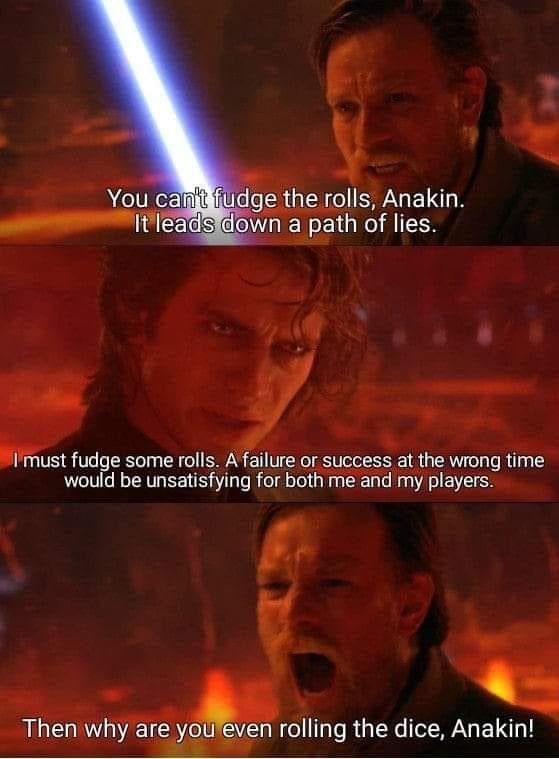this post was submitted on 03 Jun 2024
564 points (97.0% liked)
RPGMemes
10146 readers
260 users here now
Humor, jokes, memes about TTRPGs
founded 1 year ago
MODERATORS
you are viewing a single comment's thread
view the rest of the comments
view the rest of the comments

Prior to rolling, think about what will happen if the roll fails or succeeds. If you are worried about failure at all, that is a good sign that failing is probably not an option. Basically, if you are able to make the decision to fudge it when it happens you had the same time frame to decide notnto risk that need to fudge in the first place.
Over time with more experience you will find ways to make failure a bump in the road to fun tims.
if you don't even roll, then you're robbing your players from the feeling of a near miss
also taken to its extreme, your players will probably just work out that they aren't going to die at all and start taking stupid risks that they shouldn't
and yeah, at that point you can punish them, but you've been responsible for them getting to that state in the first place, so you're essentially punishing them for your own mistakes
This is another thing I fear, that causes me to do probably unnecessary rolls. I want the story/ gameplay to have at least some semblance of believability, so I don't want everyone risking their life on a curiosity because they know I won't kill them, but I also don't want to "punish" players every time they take a step off the walking path.
I'll admit it right here: sometimes I roll the dice just to give the illusion of risk, when in reality I'm buying time to make up the results of what someone just did.
I occasionally roll dice as theatre myself. In my last session, I had a troupe of traveling performers that I rolled for on each act to see if they did well or not, with each roll hidden from the players, and I would then describe the outcome to them. Most of the rolls were real, but some performers I had already decided would fail from the beginning, because they were plants for the enemy faction and had a plan going on in the background that depended on their failure at the act. But of course I still had to roll to not set off any alarms. Going to be fun when my players later piece together "oh, that hypnotist didn't actually fail, they just used mass suggestion to make everybody believe they did so they don't come under scrutiny." If a player catches on - one actually did pretty quick - then great, let them have the victory, but in general it's one of the ways I like to create expectations so I can subvert them or use them to sneak things by. The enemy faction is very guerilla-oriented, so it fits their MO pretty well.
On a more general scale, when it comes to hidden rolls, if I really need something to succeed, I'll make the roll not a matter of whether they succeed, but who succeeds. Keeps the story moving if I realize too late that that roll shouldn't have happened because a failure brings the game to a halt.
I really like the "who succeeds" idea. In events where I roll a fail and have no idea what to do with it, I can just have the outcome only happen for certain characters, or tweak the "success" so that it isn't quite so successful. Haha.